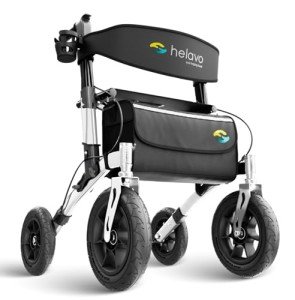Understanding the Four-Wheel Walker: A Comprehensive Guide
As individuals age or face health challenges, mobility can end up being a substantial issue. The four-wheel walker-- also called a rollator-- is developed to help those who require support while walking. This guide will explore the advantages, features, and types of four-wheel walkers, providing vital details for people, caretakers, and healthcare professionals.
What is a Four-Wheel Walker?
A four-wheel walker is a mobility aid that features four wheels, hand brakes, a seat, and typically a storage compartment. Unlike traditional walkers that require users to raise them with each action, four-wheel walkers enable smooth movement and supply extra support for individuals who might deal with balance or endurance while walking.
Key Features of a Four-Wheel Walker
| Feature | Description |
|---|---|
| Wheels | Usually features four wheels for improved mobility. |
| Brakes | Hand-operated brakes for added control and security. |
| Seat | A built-in seat enables users to rest when required. |
| Storage | Frequently consists of a storage pouch or basket for personal products. |
| Height Adjustability | Can be gotten used to fit the user's height for convenience and ease of use. |
Advantages of Using a Four-Wheel Walker
1. Boosted Mobility
Among the primary advantages of a four-wheel walker is the increased mobility it offers. Users can navigate through indoor and outdoor spaces quickly, thanks to the rolling wheels. This mobility motivates physical activity, which is vital for keeping total health.
2. Safety and Stability
Four-wheel walkers come equipped with strong frames and reliable braking systems. This design promotes safety, particularly for individuals with balance concerns, guaranteeing they feel secure while walking.
3. Comfort Features
With the addition of a seat and ergonomic handles, four-wheel walkers provide comfort throughout usage. Users can take breaks whenever needed, which is particularly useful for those who tire easily.
4. Flexibility
These walkers can be utilized in various settings, consisting of in your home, in public spaces, and outdoors. Lots of designs are developed to be lightweight and foldable, making them easy to transport.
Types of Four-Wheel Walkers
Not all four-wheel walkers are produced equal, and numerous variations deal with particular requirements and preferences. Below is a list of various kinds of four-wheel walkers:
1. Requirement Rollators
Standard rollators are the most typical type, featuring fundamental styles with four wheels, hand brakes, and a seat. They are suitable for daily usage, supplying necessary support for walking.
2. Heavy-Duty Rollators
These walkers are developed for users with higher weight-bearing requirements. Heavy-duty rollators have actually strengthened frames and broader seats, accommodating bigger individuals while supplying the exact same mobility and support.
3. Lightweight Rollators
Perfect for those who take a trip often, lightweight rollators are compact and quickly foldable. They are hassle-free for transport and are generally much easier for users to maneuver.
4. Rollators with Specialized Features
Some rollators include unique features, such as integrated LED lights for night usage, baskets developed for bring larger products, or enhanced suspension systems for enhanced comfort on unequal surfaces.
How to Choose the Right Four-Wheel Walker
Selecting the right four-wheel walker needs consideration of a number of factors. Here's a checklist to assist you:
1. User's Weight and Height
- Ensure the walker can support the user's weight.
- Select an adjustable model that accommodates the user's height for comfortable use.
2. Meant Use
- Consider where the walker will primarily be utilized: indoors, outdoors, or both.
- Try to find designs with bigger wheels for much better performance on outdoor terrains.
3. Comfort Features
- Examine the seat height and convenience level.
- Examine for additional features, such as padded manages, for improved use.
4. Storage Needs
- Figure out if the user needs a storage pouch or basket for bring individual belongings.
5. Budget
- Examine the costs, keeping in mind that prices can range widely depending on the features and brand name.
Often Asked Questions (FAQ)
Q1: Are four-wheel walkers appropriate for any ages?
A: While the majority of frequently utilized by older grownups, four-wheel walkers can benefit people of all ages who have mobility challenges due to injury, surgical treatment, or health conditions.
Q2: How do you preserve a four-wheel walker?
A: Regularly examine the wheels for debris, guarantee the brakes function correctly, and periodically tidy the walker with moderate soap and water to keep it in great working order.
Q3: Can I use a four-wheel walker outdoors?
A: Yes, numerous four-wheel walkers are created for both indoor and outdoor usage. However, choosing a model with larger, durable wheels is advisable for uneven surface areas.
Q4: Do insurance plans cover the cost of four-wheel walkers?
A: Coverage differs by insurance coverage plan. It's best to consult with your provider concerning coverage for mobility help.
Q5: How do I learn to utilize a four-wheel walker appropriately?
A: It may be beneficial to deal with a physiotherapist or health care expert to discover how to utilize a four-wheel walker safely and successfully.
Four-wheel walkers act as valuable mobility aids for those who need extra support while walking. By comprehending their features, advantages, and types, users and caregivers can pick the right design to improve mobility and preserve independence. As Premium Quality Rollator arise, it's comforting to know that tools like four-wheel walkers can significantly improve quality of life and promote a more active way of life.

